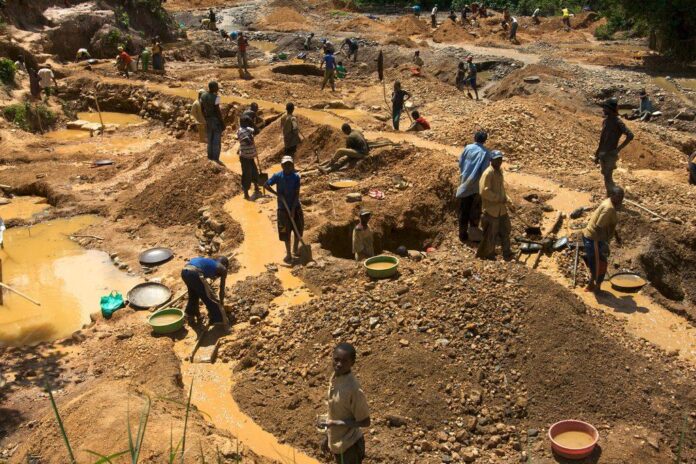A fresh controversy has emerged in Nigeria’s solid minerals sector after a new report accused certain political leaders of aiding criminal networks engaged in illegal mining activities. The investigative document, titled Violent Earth: Mining, Conflict, and Insecurity in Nigeria, was presented by Global Rights Nigeria at the 5th West African Mining Host Communities INDABA held in Abuja over the weekend. Its findings sparked heated debate among stakeholders, particularly host community representatives who openly blamed political actors for shielding illegal miners and enabling them to operate unchecked, often at the direct expense of the communities they exploit.
According to the report delivered by Abiodun Baiyewu, Executive Director of Global Rights Nigeria, the illicit activities have worsened longstanding challenges undermining the growth of the solid minerals sector. These include environmental degradation, health hazards, loss of revenue, poor investments, insecurity, and stalled development. The document emphasized that weak regulation and ineffective monitoring have compounded the crisis, with arrests and enforcement often falling far short of expectations. It further argued that Nigeria’s constitutionally entrenched federal control over mineral resources fuels conflict with state governments and discourages investors due to the bureaucratic bottlenecks surrounding the industry.
The report issued clear recommendations, urging government authorities to launch public awareness campaigns, provide sustainable alternative livelihoods for vulnerable populations, and enhance law enforcement training. It also called for stronger national security measures for critical minerals and the adoption of climate-smart mining practices to align with global sustainability standards.
At the same event, the Executive Secretary of the Nigeria Extractive Industries Transparency Initiative, Dr. Orji Ogbannaya Orji, highlighted the underperformance of the sector despite its vast potential. He revealed that Nigeria holds more than 44 different mineral types across 500 locations nationwide, yet their contribution to the national economy remains minimal. In 2023, the industry generated N401 billion, accounting for just 0.83 percent of the country’s GDP. Orji stressed that such figures demand urgent legal reforms, transparency in operations, reliable data collection, environmental protection, and stronger compliance mechanisms. He further emphasized the importance of prioritizing host community welfare and empowering rural economies to maximize the sector’s benefits.
Echoing these concerns, the National President of the Miners Association of Nigeria, ‘Dele Ayanleke, questioned the effectiveness of federal mining regulations, citing glaring resource and personnel gaps. He noted that vast regions such as Niger State are managed by only one mines inspectorate officer operating with a barely functional vehicle. Such limited capacity, he argued, makes meaningful regulation impossible. He warned that unless Nigeria strengthens its mining policies and provides adequate funding for enforcement, the sector would continue to flounder. However, he maintained that plugging these institutional gaps could set the industry on a growth path that benefits ordinary Nigerians.
From a regional perspective, the Executive Director of the Center for Social Impact Studies (CeSIS) in Ghana, Robert Tanti Ali, called for harmonization of mining policies across West Africa. Speaking at the sidelines of the conference, he underscored the shared challenges faced by countries in the region, noting that illegal mining continues to devastate communities in Ghana, Côte d’Ivoire, and Burkina Faso, just as in Nigeria. He stressed the need for collective solutions under the guidance of ECOWAS directives on harmonization, urging nations to collaborate in designing unified principles and guidelines for the extractive sector. In Ghana, he revealed, illegal mining has become a national crisis, destroying water bodies and farmland, which underscores the urgency of cross-border cooperation.
The Abuja gathering brought to the forefront the systemic failures plaguing Africa’s solid mineral sector. It also revealed the deep frustration of host communities and experts alike who believe that without immediate reforms, the region risks losing not only critical economic opportunities but also the stability of its environment, security, and livelihoods.

